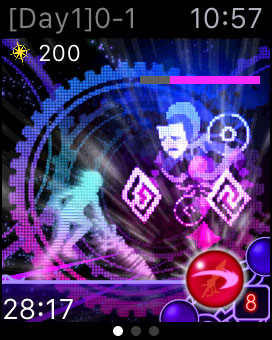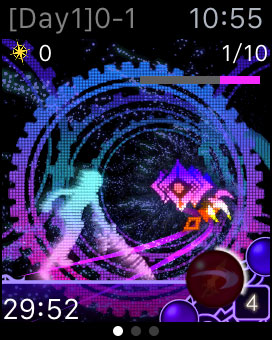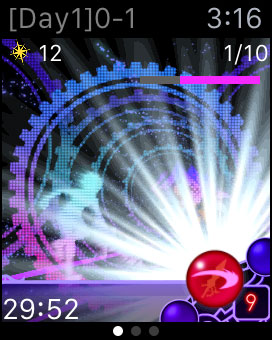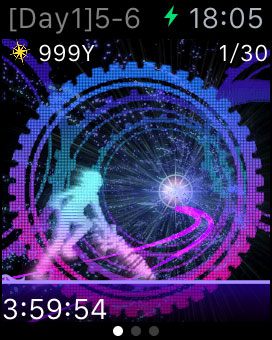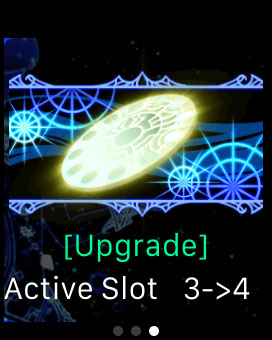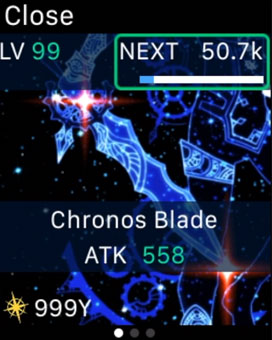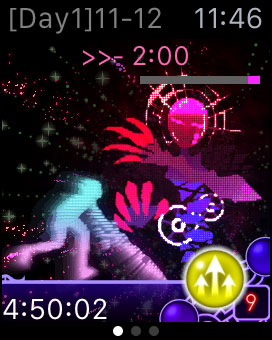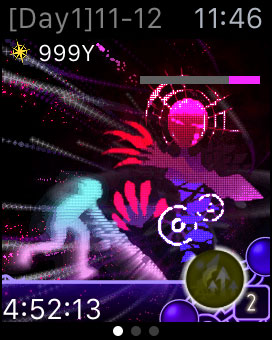A fun concept that doesn’t work
Cosmos Rings is not subtle about the fact that the Apple Watch is its entire novelty. The theoretically narrative-driven experience puts you in control of a “god” who, in an attempt to make life better for humanity, briefly stops, and then breaks time. To set things right, he must travel the timeless void, helping individual humans accept that time must continue … And fight time demons.
Cosmos Rings is not subtle about the fact that the Apple Watch is its entire novelty.
This is the concept, here’s the reality: You watch a silhouette of a man, sword unsheathed, running through a purple space and various monsters. You can tap on the watch every few seconds to trigger a power-up that will let your character faster or more powerful. Between levels, you read short stories of human characters, completely unrelated to the sword-fighting taking place during the game. Even by the low bar that we use to judge video game narratives, it feels disjointed.
Prepare to stare at your wrist for a half hour
In fact, the very concept of an “Apple Watch RPG” seems forced. The defining function of the watch, or any wearable tech, is the quick glance. If you want to see who called you, but don’t want to pull out your phone? It’s on the watch. Need to call a car? Pull up Uber and tap to request it. Games, and RPGs in particular, are meant to be sustained distractions. Whether its five minutes or five hours, there is generally some kind of rapport between the player and the game. On a watch, that means standing or sitting, hunched over your tiny watch for a long time.
How long? Cosmos Rings gives players 30 minutes to complete its first world, which comprises twelve levels, called “Hours.” That timer counts down even when you aren’t playing, and only stops at certain specific points. In other words, rather than allowing you to quickly glance down and play the game the way you might engage your watch, you’re forced to sit and stare at it for a sustained period of time. Even with enemies sapping time, rather than draining a conventional health bar, you may still spend 20 minutes completing it.
While the idea that “time stops for no one” is philosophically compelling, it is demanding for a device that is otherwise meant to blend seamlessly into your everyday life.
What would a good wearable game look like?
Cosmos Rings makes a strong case to avoid all wearable games, but it would be shortsighted to condemn all games trying to make it work on smartwatches. Games like Lifeline, a text-based adventure game where players advise an astronaut stranded on an alien world, succeed by catering the unique characteristics of a wearable — namely that users always have them on hand, but want to spend as little time using them as possible.
Since the Apple Watch is really just an extension of an iPhone, maybe the best Apple Watch games need to be spin-offs or side-experiences tided to more expansive mobile games. The Pokémon series, both on mobile with Pokémon Go and the upcoming Nintendo 3DS sequels Sun and Moon have wearable toys coming out that will augment the experience.
Not every publisher should produce a custom wearable toy for big game releases, but there is a certain appeal to having a wearable that allows you to occasionally sustain your connection to your favorite game. Second-screen applications like Xbox SmartGlass may not have panned out, but a quicker, less-demanding, wearable connection might be a fun way to keep players gaming even after they put their phones or consoles away. Better yet, augmenting a wearable with your favorite game may be the best way to make wearable notifications feel less intrusive and more helpful.
Just because wearable gaming probably can’t successful emulate console RPGs, or even mobile games, doesn’t mean it won’t eventually find its own way.
